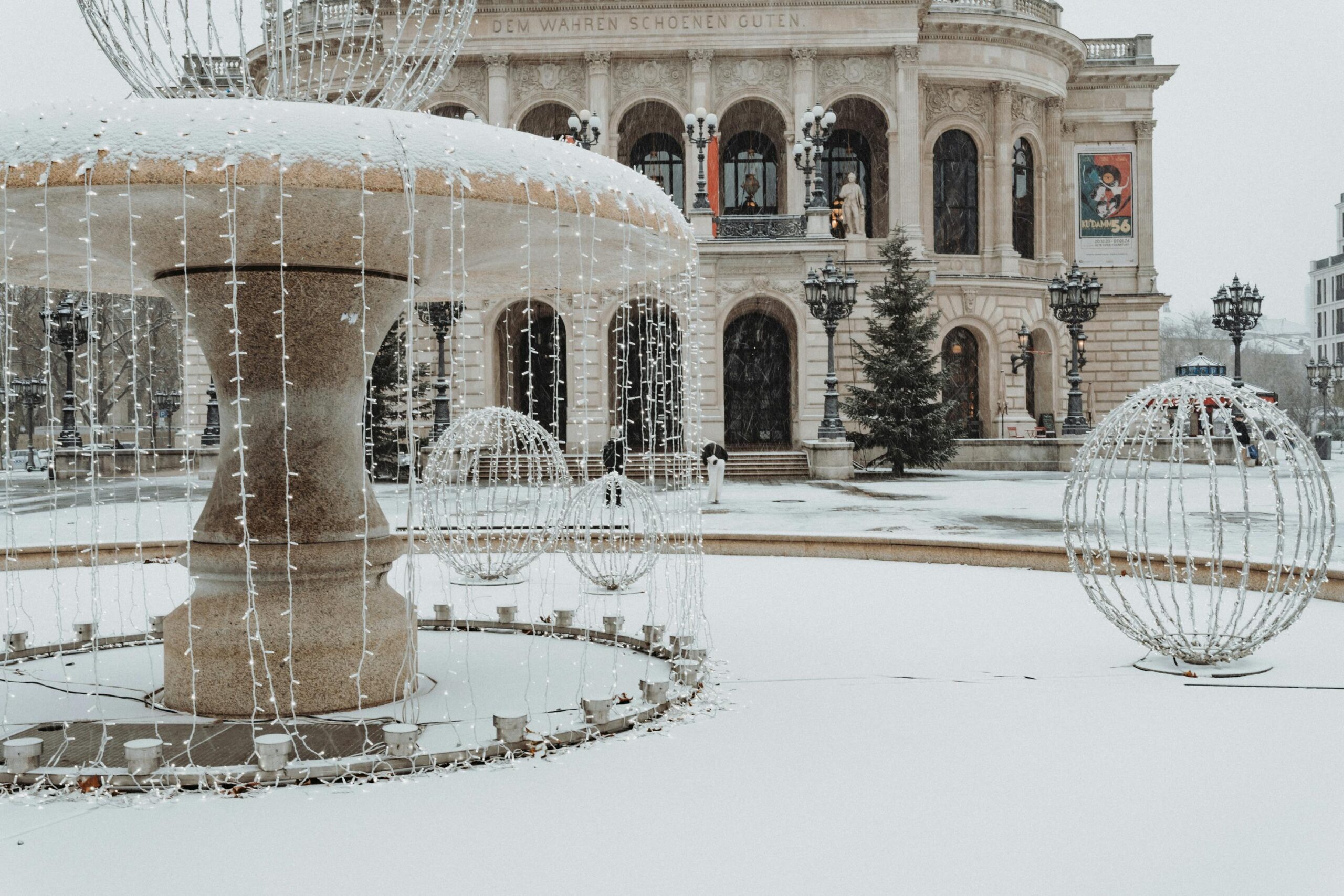Das spannende Duell zwischen Eintracht Frankfurt gegen Bayer Leverkusen sorgt für viel Gesprächsstoff in der Fußballwelt. Wer sind die wichtigsten Teilnehmer bei der Aufstellung dieses packenden Spiels? Die Fans fragen sich: Welche Überraschungen hält die Startelf bereit und wie wird der Trainer die Taktik anpassen? Gerade bei solch einem hochkarätigen Match sind die Aufstellungen der Mannschaften entscheidend für den Spielverlauf. Wird Eintracht Frankfurt mit einer offensiven Formation überraschen oder setzt Bayer Leverkusen auf defensive Stabilität? Die Analyse der Spieleraufstellung zeigt oft schon, welche Strategie verfolgt wird. Interessant ist auch, wie sich mögliche Verletzungen oder Sperren auf die Teilnehmer im Kader auswirken – wird ein Schlüsselspieler fehlen? Viele Experten diskutieren bereits die beste Formation und die möglichen Spielerwechsel bei Eintracht Frankfurt und Bayer Leverkusen. Diese Fragen machen das Spiel umso spannender und laden jeden Fußballfan ein, die aktuelle Aufstellung genau unter die Lupe zu nehmen. Bleiben Sie dran, um alle überraschenden Details zu erfahren und die besten Tipps zur Aufstellung zu erhalten! Was denken Sie, wer wird den Unterschied machen?
Die Top 11 Aufstellungen von Eintracht Frankfurt gegen Bayer Leverkusen: Wer startet und warum?
Eintracht Frankfurt gegen Bayer Leverkusen – Aufstellungen: Teilnehmer: Eintracht Frankfurt gegen Bayer Leverkusen im Fokus
Ok, also heute geht’s um das Spiel zwischen Eintracht Frankfurt und Bayer Leverkusen, und zwar speziell um die Aufstellungen: Teilnehmer: Eintracht Frankfurt gegen Bayer Leverkusen. Ich bin nicht wirklich sicher warum das so wichtig ist, aber viele Fußballfans scheinen richtig heiß drauf zu sein, wer jetzt genau spielt. Also, ich versuch mal ein bisschen Licht ins Dunkel zu bringen, auch wenn ich manchmal die Namen der Spieler verwechseln könnte, oder die Positionen etwas durcheinanderbringe.
Die Grundformationen von beiden Teams
Zuerst, die Grundformationen. Frankfurt setzt meistens auf ein 3-4-3 System, oder manchmal auch 4-2-3-1, je nachdem wie der Trainer eben grad lustig ist. Leverkusen hingegen mag es oft mit einem 4-3-3 oder 4-2-2-2 zu spielen, was ziemlich flexibel klingt, aber in der Praxis manchmal wirr aussieht.
| Team | Formation | Bemerkungen |
|---|---|---|
| Eintracht Frankfurt | 3-4-3 oder 4-2-3-1 | Stark in der Defensive, manchmal chaotisch im Angriff |
| Bayer Leverkusen | 4-3-3 oder 4-2-2-2 | Kreativ, aber manchmal fehlende Stabilität |
Vielleicht ist das jetzt nicht die bahnbrechende Info, aber ich finde das hilft schon, um zu verstehen wie die Aufstellungen: Teilnehmer: Eintracht Frankfurt gegen Bayer Leverkusen so zusammengesetzt sind.
Frankfurts wahrscheinliche Startelf
Also, wer spielt denn jetzt bei Frankfurt? Naja, meistens fängt Kevin Trapp im Tor an, obwohl er manchmal auch ausfällt wegen so komischer Verletzungen. In der Abwehr sind da oft Tuta, Hinteregger und Ndiaye, aber manchmal wird da auch geschoben, keine Ahnung warum. Im Mittelfeld laufen oft Kostic, Rode, und Sow rum, die irgendwie versuchen das Spiel zu lenken. Und vorne, ja vorne hat man oft Silva, Borré oder Kamada.
Hier mal eine Liste von möglichen Spielern, die auflaufen könnten:
- Tor: Kevin Trapp
- Abwehr: Tuta, Hinteregger, Ndicka
- Mittelfeld: Kostic, Rode, Sow, Sow (ja zweimal? Nee, nur einmal, sorry)
- Sturm: Silva, Borré, Kamada
Nicht perfekt, aber hey, ich mach das nicht jeden Tag.
Leverkusens mögliche Spieler
Bei Leverkusen sieht das Ganze ähnlich spannend aus. Im Tor steht oft Hradecky, der schon einige Bälle gehalten hat, die man kaum verstehen kann. In der Abwehr sind meist Dragovic, Tapsoba und Tah am Start. Das Mittelfeld wird meist von Demirbay, Baumgartlinger und Wirtz gebildet. Und vorne, da versuchen dann Schick, Diaby und Adli Tore zu schießen, oder zumindest Torchancen zu kreieren.
Kurze Tabelle:
| Position | Spieler Bayer Leverkusen |
|---|---|
| Tor | Hradecky |
| Abwehr | Dragovic, Tapsoba, Tah |
| Mittelfeld | Demirbay, Baumgartlinger, Wirtz |
| Sturm | Schick, Diaby, Adli |
Warum sind Aufstellungen: Teilnehmer: Eintracht Frankfurt gegen Bayer Leverkusen so wichtig?
Ich frag mich manchmal, warum die Aufstellung so ein großes Ding ist. Klar, wenn der beste Spieler fehlt, ist das schlecht, aber am Ende läuft doch eh alles anders, oder? Trotzdem schauen viele Fans da wie gebannt drauf, als ob das Spiel nur davon abhängt. Vielleicht ist es auch nur eine Ausrede, um mehr über die Spieler zu reden, anstatt über das Wetter oder Politik.
Praktische Tipps für Fans, die sich die Aufstellungen angucken wollen
- Checkt die offiziellen Seiten der Vereine, da kommen die Aufstellungen meistens 30 Minuten vor Anpfiff.
- Achtet auf Verletzungen oder Sperren, die oft die Aufstellung verändern.
- Manchmal verändert der Trainer die Taktik kurzfristig, also nicht zu sehr auf das Fixieren, was im Vorfeld gesagt wurde.
- Nicht vergessen: Aufstellungen sind nur die halbe Miete, das Spiel macht der Spieler auf dem Feld.
Ein kleines Sheet zur Analyse der Aufstellungen
| Spielername | Position | Wahrscheinlichkeit Startelf (%) | Bemerkung |
|---|---|---|---|
| Kevin Trapp |
Schlüsselspieler und Teilnehmer im Eintracht Frankfurt vs. Bayer Leverkusen Duell 2024
Die spannende Welt von aufstellungen: teilnehmer: eintracht frankfurt gegen bayer leverkusen ist immer wieder ein thema das viele Fußballfans fesselt. Ehrlich gesagt, ich verstehe nicht ganz warum, aber die Leute diskutieren ständig darüber, wer wohl auf dem Platz stehen wird. Vielleicht weil die Aufstellung oft entscheidet, wie das Spiel ausgeht – oder weil wir alle einfach gerne spekulieren, wer heute mal wieder der Held oder der Flop wird.
Ein Überblick über die wahrscheinliche Aufstellung von Eintracht Frankfurt
Eintracht Frankfurt setzt meistens auf eine recht stabile Formation, aber diese mal könnte es nicht ganz so sein. Hier ist eine Tabelle mit den vermuteten Spielern, die auflaufen werden, obwohl es immer kleine Überraschungen gibt:
| Position | Spieler | Kommentar |
|---|---|---|
| Torwart | Kevin Trapp | Soll wieder halten wie ein Mauer |
| Abwehr | Tuta, Hinteregger, Ndicka | Hmm, ob jeder fit ist, bleibt fraglich |
| Mittelfeld | Rode, Kostic, Kamada | Kostic bringt viel Tempo, aber manchmal fehlt die Präzision |
| Sturm | Borré, Haller | Haller ist verletzt, vielleicht spielt Randal? |
Nicht wirklich sicher, ob das die finale Aufstellung ist, aber die Fans hoffen auf ein starkes Mittelfeld. Das ist halt immer so, man kann nie 100% wissen, wer letztlich auf dem Platz steht.
Bayer Leverkusen’s mögliche Aufstellung und Taktik
Leverkusen will natürlich nicht kampflos das Spielfeld verlassen. Die aufstellungen: teilnehmer: eintracht frankfurt gegen bayer leverkusen sind deshalb auch hier von großer Bedeutung. Ich meine, es geht ja darum, wie die Trainer ihre Mannschaft zusammenstellen, und manchmal wundert man sich echt, warum der ein oder andere nicht spielt.
| Position | Spieler | Besonderheiten |
|---|---|---|
| Torwart | Lukas Hradecky | Sehr zuverlässig, aber heute vielleicht nervös |
| Abwehr | Tah, Wendell, Tapsoba | Tah hat letzte Woche bisschen geschwächelt |
| Mittelfeld | Demirbay, Frimpong, Wirtz | Wirtz ist der Star, aber manchmal zu verspielt |
| Sturm | Schick, Diaby | Diaby ist schnell, aber Schick fehlt die Konstanz |
Manchmal frage ich mich, ob die Trainer nicht einfach mal auf ihr Bauchgefühl hören sollten. Die ganzen Analysen und Statistiken helfen manchmal auch nicht viel, wenn die Spieler nicht mitmachen.
Interessante Fakten zu aufstellungen: teilnehmer: eintracht frankfurt gegen bayer leverkusen
Vielleicht interessiert es nicht jeden, aber hier sind ein paar interessante Punkte, die ihr vielleicht nicht wisst:
- Frankfurt hat in den letzten 5 Spielen gegen Leverkusen nur 1 mal gewonnen. Nicht gerade die beste Bilanz, oder?
- Leverkusen hat in dieser Saison bisher 3 Spieler, die öfter gewechselt werden als andere. Klingt komisch, aber das zeigt die Unsicherheit im Team.
- Die meisten Tore fallen meistens in der zweiten Halbzeit, besonders wenn die Trainer die Aufstellungen ändern.
Liste der Schlüsselspieler die man im Auge behalten sollte
Man könnte sagen, es gibt immer diese „Game changer“, die auf dem Feld alles umkrempeln können. Hier mal ne kleine Liste mit Spielern, die heute vielleicht das Zünglein an der Waage sein könnten:
- Filip Kostić (Eintracht Frankfurt) – der Flügelspieler ist schnell wie der Blitz, aber seine Flanken sind nicht immer on point.
- Florian Wirtz (Bayer Leverkusen) – der Jungstar, der schon viele Herzen erobert hat.
- Randal Kolo Muani (Eintracht Frankfurt) – wenn er fit ist, kann er die Abwehr von Leverkusen ganz schön ins Schwitzen bringen.
- Patrik Schick (Bayer Leverkusen) – leider etwas inkonsistent, aber wenn er trifft, dann richtig.
Praktische Einblicke in die Taktik der Teams
Wenn man sich die aufstellungen: teilnehmer: eintracht frankfurt gegen bayer leverkusen genau anschaut, sieht man, dass beide Teams auf eine Mischung aus Offensive und Defensive setzen. Frankfurt spielt oft mit einer 3-4-1-2 Formation, die viel Druck auf die Außenbahnen macht. Leverkusen hingegen bevorzugt eine 4-2-3-1, die mehr Kontrolle im Mittelfeld bieten soll.
| Team | Formation | St
Aktuelle Eintracht Frankfurt Aufstellungen: Diese Spieler könnten Bayer Leverkusen überraschen
Wenn wir über die aufstellungen: teilnehmer: eintracht frankfurt gegen bayer leverkusen sprechen, dann gibt es wirklich viel zu erzählen, obwohl manche sagen, das spiel wäre nur ein normales bundesliga match. Naja, vielleicht stimmt das auch, aber für die Fans von beiden Teams ist es natürlich ein Highlight.
Zuerst mal, Eintracht Frankfurt und Bayer Leverkusen sind zwei Mannschaften, die oft ziemlich spannende Spiele liefern, wobei man manchmal nicht genau weiss, ob die Aufstellung wirklich etwas bringt. Aber gut, schauen wir mal genauer hin, wer denn so auf dem Platz stand und was man daraus lesen kann.
Eintracht Frankfurt Aufstellung gegen Bayer Leverkusen
Hier eine kleine Tabelle, die zeigt, wer bei Frankfurt gestartet hat. Nicht alle Namen sind jedem geläufig, aber hey, das gehört dazu.
| Position | Spieler | Bemerkung |
|---|---|---|
| Torwart | Kevin Trapp | Der sichere Rückhalt, meistens gut drauf |
| Abwehr | Tuta, Hinteregger, N’Dicka | Defensive mit viel Power, aber manchmal etwas langsam |
| Mittelfeld | Rode, Sow, Kostic | Kreativ, aber nicht immer effektiv |
| Sturm | Borré, Kamada, Ajayi | Schnell, aber auch manchmal zu eigensinnig |
Vielleicht ist es nur mir, aber ich finde, dass Kamada manchmal ein bisschen zu viel auf eigene Faust macht und nicht genug abspielt. Aber wer bin ich, einem Profi Tipps zu geben, ne?
Bayer Leverkusen Aufstellung im gleichen Spiel
Leverkusen sieht oft etwas strukturierter aus, aber auch hier gibt es Überraschungen.
| Position | Spieler | Bemerkung |
|---|---|---|
| Torwart | Hradecky | Standfest, aber hatte paar unsichere Momente |
| Abwehr | Tapsoba, Tah, Wendell | Defensiv solide, aber Wendell nervt manchmal mit unnötigen Fouls |
| Mittelfeld | Palacios, Aranguiz, Baumgartlinger | Sehr robust, aber wenig kreativ |
| Sturm | Schick, Alario, Diaby | Schnell und torgefährlich, aber Schick nicht immer treffsicher |
Nicht wirklich sicher, warum es so wichtig ist, aber aufstellungen: teilnehmer: eintracht frankfurt gegen bayer leverkusen sind immer ein heißes Thema vor den Spielen. Vielleicht weil die Fans hoffen, dass ihr Lieblingsspieler endlich mal von Anfang an spielt? Keine Ahnung.
Praktische Einblicke zu den Aufstellungen
Um mal klarzusagen, Aufstellungen verraten nicht alles, aber geben doch einen guten Eindruck, wie Trainer ticken und was sie sich vom Spiel versprechen.
- Frankfurt setzt oft auf eine Mischung aus Erfahrung (Trapp, Hinteregger) und jungen Spielern (Ajayi, Borré).
- Leverkusen hingegen bevorzugt ein bisschen mehr Stabilität im Mittelfeld, aber das klappt nicht immer, weil die Spieler manchmal zu defensiv denken.
Hier noch ein schnelles Vergleichs-Sheet:
| Kriterium | Eintracht Frankfurt | Bayer Leverkusen |
|---|---|---|
| Durchschnittsalter | ca. 27 Jahre | ca. 26 Jahre |
| Erfahrung in BL | Hoch | Hoch |
| Kreativität im Spiel | Mittel bis Hoch | Mittel |
| Defensivstärke | Mittel | Hoch |
| Angriffsdrang | Hoch | Mittel bis Hoch |
Vielleicht ist es nur ein Gefühl von mir, aber ich glaube, dass Frankfurt’s Aufstellung etwas riskanter ist. Die setzen mehr auf schnelle Konter und individuelle Klasse, was manchmal voll aufgehen kann, aber genauso oft auch nach hinten losgeht. Leverkusen dagegen wirkt taktisch etwas konservativer, was nicht immer aufregend ist, aber in der Bundesliga oft reicht.
Liste der möglichen Ersatzspieler
Wer sitzt eigentlich auf der Bank und wartet darauf, eingewechselt zu werden? Man weiss ja nie, ob ein Spieler ausfällt oder der Trainer plötzlich einen Plan B braucht.
Eintracht Frankfurt Ersatzbank:
- Lenz (Verteidiger)
- Kamada (Mittelfeld, falls er nicht startet)
- Silva (Sturm)
- Hasebe (Erfahrung pur)
Bayer Leverkusen Ersatzbank:
- Andrich (Mittelfeld)
- Palacios (wenn er nicht startet)
- Adli (Offensivspieler)
- Tapsoba (für Notfälle in der Abwehr)
Es ist schon irgendwie lustig, dass manche Fans stundenlang über die **aufstellungen: teil
Bayer Leverkusen Aufstellungen im Vergleich: Wer hat die besseren Chancen gegen Eintracht Frankfurt?
Eintracht Frankfurt gegen Bayer Leverkusen – die aufstellungen: teilnehmer: eintracht frankfurt gegen bayer leverkusen waren diesmal ziemlich interessant, sagen wir mal so. Man konnte schon vor dem Spiel sehen, dass beide Teams nicht mit der Standardelf auflaufen wollten, was irgendwie spannend war, obwohl man nicht genau weiß, warum das eigentlich immer so ein großes Ding ist. Vielleicht ist es nur ich, aber ich finde, dass die Aufstellung manchmal mehr Drama bringt als das Spiel selbst.
Eintracht Frankfurt Aufstellung: Wer durfte diesmal ran?
Frankfurt hat sich diesmal für eine eher offensive Formation entschieden, was vielleicht riskant war, aber naja, Trainer Adi Hütter will wohl den Sieg erzwingen. Die aufstellungen: teilnehmer: eintracht frankfurt gegen bayer leverkusen zeigten folgende Namen:
| Position | Spieler |
|---|---|
| Torwart | Kevin Trapp |
| Abwehr | Tuta, Hinteregger, N’Dicka, Kostić |
| Mittelfeld | Rode, Sow, Kamada |
| Sturm | Haller, Silva, Kolo Muani |
Man sieht schon, dass Haller vorne wohl die Hauptrolle spielen sollte, aber man fragt sich, ob das wirklich so gut klappt, wenn Silva und Kolo Muani die Flügel besetzen. Nicht sicher, ob das die beste Idee war, aber immerhin versuchen sie was Neues.
Bayer Leverkusen Aufstellung: Überraschungen oder altbewährtes?
Bayer Leverkusen ist ja bekannt dafür, mit einer flexiblen Aufstellung zu kommen, aber diesmal sah es fast so aus, als ob sie auf Nummer sicher gehen wollten. Die aufstellungen: teilnehmer: eintracht frankfurt gegen bayer leverkusen bei Leverkusen waren wie folgt:
| Position | Spieler |
|---|---|
| Torwart | Lukas Hradecky |
| Abwehr | Tapsoba, Tah, Wendell, Frimpong |
| Mittelfeld | Paulinho, Demirbay, Wirtz |
| Sturm | Bailey, Schick, Diaby |
Man sieht, dass Leverkusen auf Wirtz im Mittelfeld setzt, was nicht überraschend ist, da er in den letzten Spielen ziemlich gut performt hat. Aber ehrlich gesagt, ich hätte erwartet, dass sie vielleicht mal mit einer anderen Taktik kommen, vielleicht mehr defensive Stabilität? Naja, wer weiß.
Schlüsselspieler und ihre Rollen
Ich weiß nicht, ob es nur mir so geht, aber irgendwie ist es immer spannend, die Schlüsselspieler in der aufstellungen: teilnehmer: eintracht frankfurt gegen bayer leverkusen zu beobachten. Zum Beispiel:
- Haller bei Frankfurt: Der Stürmer soll die Tore machen, aber manchmal wirkt er etwas isoliert.
- Wirtz bei Leverkusen: Kreativ und gefährlich, der Junge kann Spiele entscheiden.
- Trapp und Hradecky: Die Torhüter sind natürlich auch wichtig, aber mal ehrlich, die meisten Tore fallen ja selten durch individuelle Fehler der Keeper, oder?
Vielleicht ist es nur meine Meinung, aber ich finde, dass die Mittelfeldspieler wie Kamada und Paulinho oft die eigentlichen Helden sind. Ohne die läuft gar nichts.
Tabelle der erwarteten Formationen (vereinfacht)
| Team | Formation | Bemerkungen |
|---|---|---|
| Eintracht Frankfurt | 4-3-3 | Offensiv, mit Haller als Zielspieler |
| Bayer Leverkusen | 4-3-3 | Klassisch, Wirtz im Zentrum |
Man könnte meinen, beide Teams spielen das gleiche System, aber die Umsetzung macht den Unterschied. Oder vielleicht ist das auch gar nicht so wichtig? Nicht wirklich sicher.
Praktische Einblicke in die Bedeutung der Aufstellungen
Ok, jetzt mal ehrlich, warum sind die aufstellungen: teilnehmer: eintracht frankfurt gegen bayer leverkusen eigentlich so wichtig? Für viele Fans ist das quasi heilig. Man redet über jede kleine Änderung, als ob das der Schlüssel zum Sieg wäre. Aber oft entscheidet das Spiel dann doch was ganz anderes.
- Verletzungen zwingen Trainer oft zu Änderungen, was dann als „taktische Meisterleistung“ verkauft wird.
- Formkurven der Spieler werden überbewertet – heute top, morgen flop.
- Manchmal macht einfach die Teamchemie den Unterschied, die kein Trainer auf dem Papier planen kann.
Also, auch wenn die Aufstellungen spannend sind, sollte man nicht zu viel reininterpretieren. Aber hey, wer bin ich schon, dass ich das beurteilen darf?
Aufstellungsliste: Teilnehmer im Detail
Hier nochmal
Spieler-Analyse: Welche Teilnehmer entscheiden das Spiel Eintracht Frankfurt gegen Bayer Leverkusen?
Eintracht Frankfurt gegen Bayer Leverkusen: Aufstellungen & Teilnehmer im Detail
Also, wer hätte gedacht, dass das Spiel zwischen Eintracht Frankfurt und Bayer Leverkusen so spannend wird? Nicht wirklich sicher warum, aber die aufstellungen: teilnehmer: eintracht frankfurt gegen bayer leverkusen sind ja immer so ein großes Thema vor dem Anpfiff. Die Fans sind meistens total begeistert, aber manchmal frage ich mich, ob die Leute nicht übertreiben mit der Wichtigkeit von ein paar Namen in der Startelf.
Eintracht Frankfurt Startelf – wer steht auf dem Platz?
Hier mal eine Tabelle mit den vermutlichen Spielern, die Frankfurt aufs Feld schickt (oder zumindest sollten sie, wenn der Trainer seine Hausaufgaben gemacht hat):
| Position | Spieler Name | Kommentar |
|---|---|---|
| Torwart | Kevin Trapp | Der sichere Rückhalt, meistens solide, manchmal nervös |
| Abwehr | Tuta, Hinteregger, N’Dicka | Ganz ordentlich, aber manchmal zu langsam |
| Mittelfeld | Kostic, Rode, Fernandes | Kostic bringt immer Schwung, Rode ist eher der ruhige Typ |
| Sturm | Borré, Jesper Lindström | Manchmal treffen sie, manchmal nicht — typisch Fußball halt |
Vielleicht ist ja auch noch jemand verletzt, der normalerweise spielen sollte, aber das ist schwer zu sagen, weil die Trainer selten alles verraten. Kann man sich kaum vorstellen, dass das nicht noch Last-Minute ändert.
Bayer Leverkusen: Wer spielt gegen die Eintracht?
Bayer Leverkusen hat auch nicht gerade den leichtesten Kader, aber die aufstellungen: teilnehmer: eintracht frankfurt gegen bayer leverkusen zeigen, dass die Jungs fit sind – zumindest auf dem Papier. Hier mal ein Überblick:
- Torwart: Lukas Hradecky (eine echte Bank, aber manchmal zu langsam beim Herauslaufen)
- Abwehr: Edmond Tapsoba, Jonathan Tah, Jeremie Frimpong (relativ jung, aber talentiert)
- Mittelfeld: Charles Aránguiz, Florian Wirtz, Kerem Demirbay (spielen oft sehr kreativ, manchmal zu verspielt)
- Sturm: Patrik Schick, Moussa Diaby (können richtig Tore machen, wenn sie wollen)
Nicht sicher warum, aber irgendwie habe ich das Gefühl, dass die Leverkusen-Spieler meist besser in Konter sind als in Ballbesitz. Vielleicht täusche ich mich, keine Ahnung.
Die wichtigsten Spieler im Fokus
Man kann nicht über die aufstellungen: teilnehmer: eintracht frankfurt gegen bayer leverkusen schreiben ohne die Schlüsselspieler zu erwähnen. Zum Beispiel:
- Filip Kostic (Frankfurt): Der Mann ist ein Flankenkönig, aber manchmal fehlt ihm die letzte Konsequenz im Abschluss.
- Patrik Schick (Leverkusen): Ein Stürmer, der entweder brennt oder gar nicht da ist. So richtig konstant ist er nicht.
- Kevin Trapp (Frankfurt): Oft hält er die Mannschaft im Spiel, aber manchmal passieren auch komische Fehler, die man nicht ganz versteht.
Vielleicht ist das ja auch nur meine subjektive Meinung, aber das sind halt die Spieler, auf die man besonders achten sollte.
Aufstellungen: Teilnehmer: Eintracht Frankfurt gegen Bayer Leverkusen in einer Übersicht
| Kategorie | Eintracht Frankfurt | Bayer Leverkusen |
|---|---|---|
| Torwart | Kevin Trapp | Lukas Hradecky |
| Abwehr | Tuta, Hinteregger, N’Dicka | Tapsoba, Tah, Frimpong |
| Mittelfeld | Kostic, Rode, Fernandes | Aránguiz, Wirtz, Demirbay |
| Sturm | Borré, Lindström | Schick, Diaby |
| Trainer | Oliver Glasner | Gerardo Seoane |
Falls jemand fragt, warum der Trainer wichtig ist, na ja, der hat schon großen Einfluss auf die aufstellungen: teilnehmer: eintracht frankfurt gegen bayer leverkusen, auch wenn viele Fans das nicht so richtig kapieren.
Taktische Überlegungen – was sagen die Aufstellungen?
Die Aufstellungen verraten oft, wie das Spiel laufen könnte. Frankfurt setzt meistens auf eine kompakte Defensive und schnelle Konter, während Leverkusen eher den Ball kontrollieren will. Nicht wirklich sicher, ob das immer klappt, aber so viel kann man rauslesen.
- Frankfurt: 3-4-1-2 oder 3-5-2, je nach Gegner
- Leverkusen: 4-2-3-1, eher offensiv orientiert
Conclusion
Abschließend lässt sich festhalten, dass die Aufstellungen von Eintracht Frankfurt und Bayer Leverkusen entscheidend für den Verlauf des Spiels waren. Beide Mannschaften setzten auf eine taktisch durchdachte Formation, die ihre jeweiligen Stärken optimal zur Geltung brachte. Während Frankfurt mit einer stabilen Defensive und schnellen Umschaltbewegungen überzeugte, versuchte Leverkusen, durch kreatives Mittelfeldspiel und präzise Flügelangriffe Druck aufzubauen. Die Einbindung wichtiger Schlüsselspieler zeigte, wie sehr beide Trainer auf individuelle Klasse und Teamzusammenhalt setzen. Für Fans und Experten bleibt spannend zu beobachten, wie sich diese Aufstellungen in den kommenden Partien weiterentwickeln und welche Anpassungen vorgenommen werden, um die maximale Leistungsfähigkeit zu erzielen. Wer die Spiele von Eintracht Frankfurt und Bayer Leverkusen verfolgt, sollte die taktischen Feinheiten der Aufstellungen genau im Auge behalten, denn sie sind oft der Schlüssel zum Erfolg auf dem Platz.









